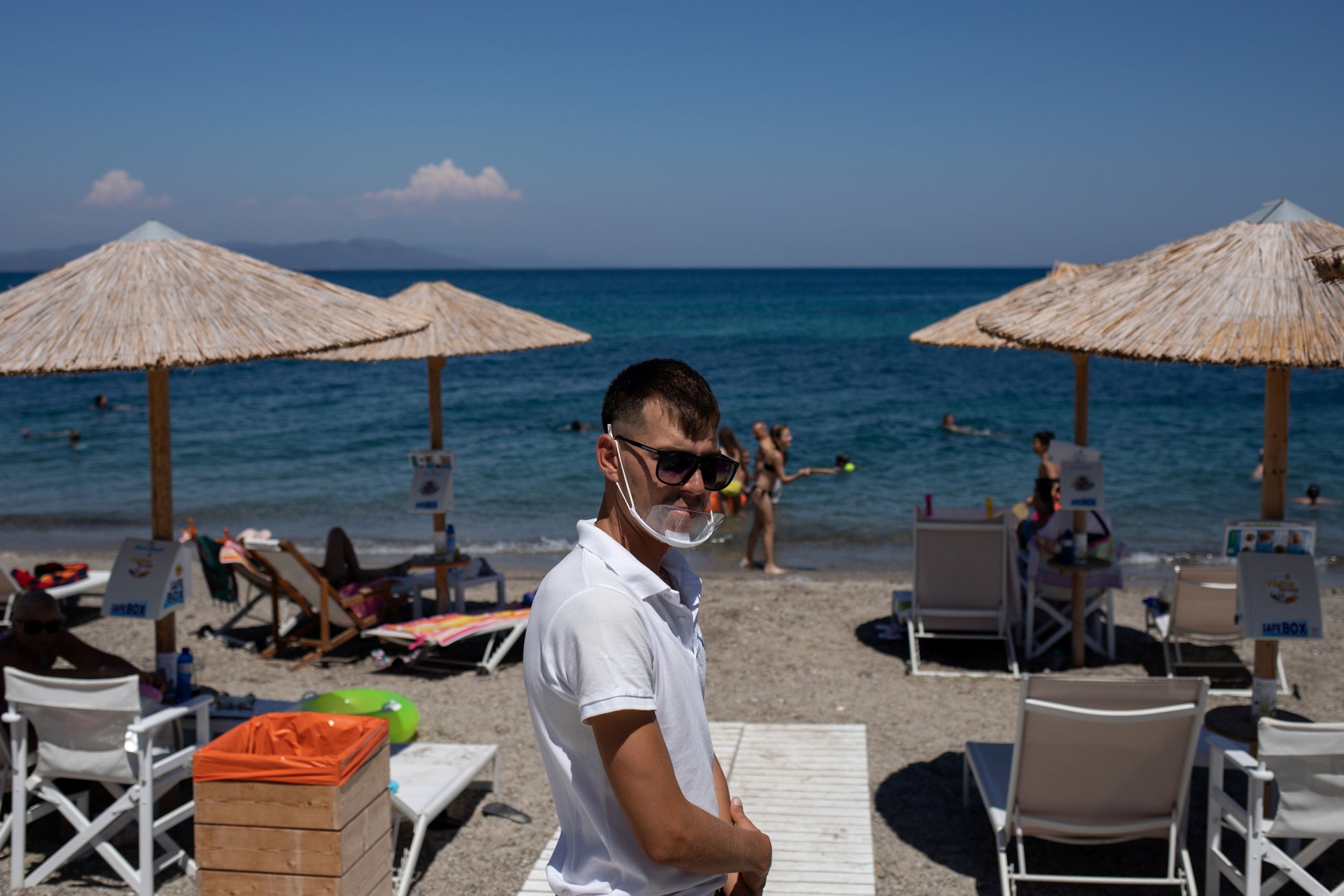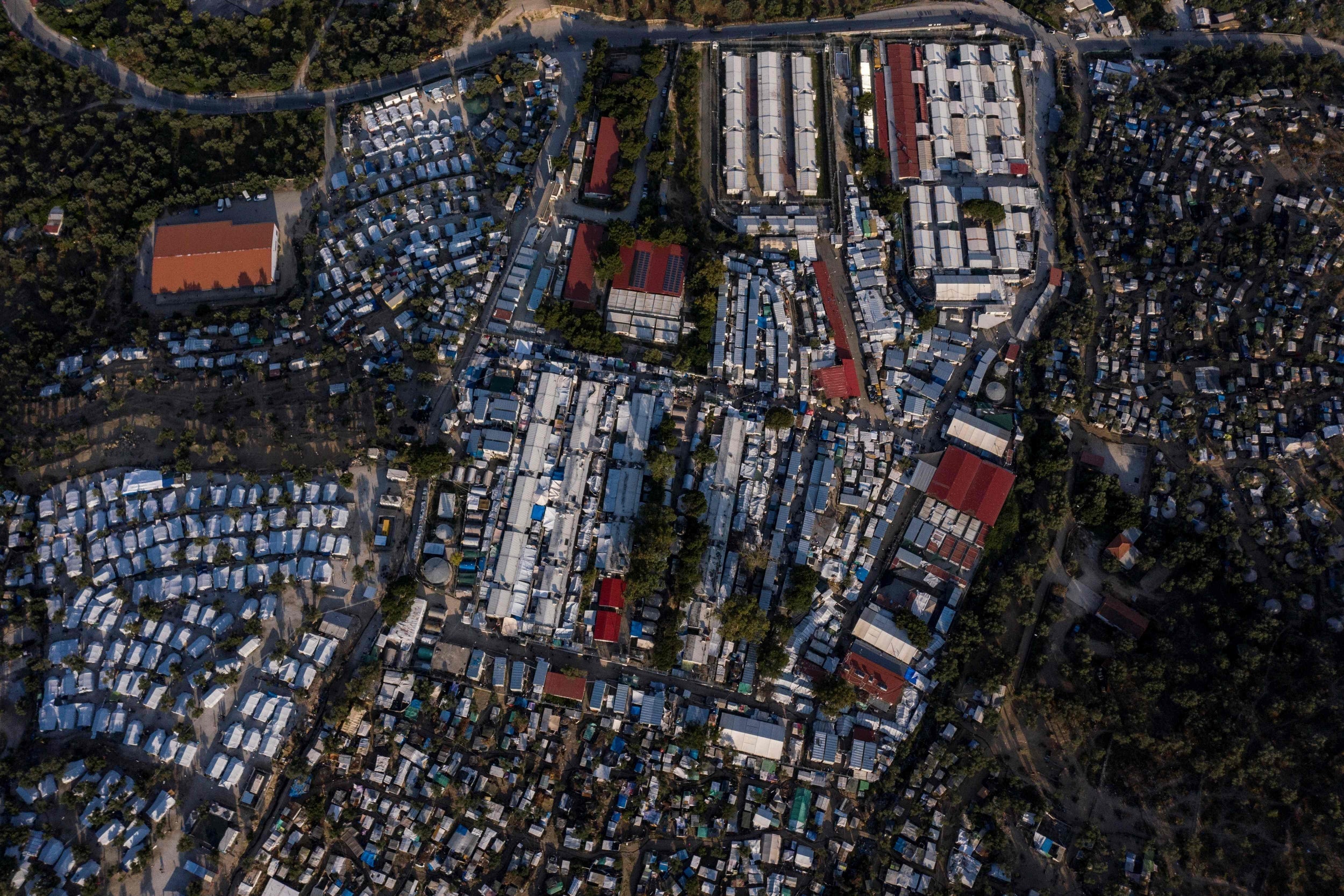A tale of two countries: As Greece welcomes tourists, refugees remain under lockdown
Greek government is accused of showing a clear distinction between two different categories of foreigners: the tourists and the migrants, writes Katy Fallon

When the Greek prime minister announced that the country was open for tourism on the sunset island of Santorini on 13 June, some 36 refugees and migrants were stranded nearby, desperately trying to reach the shores of Lesbos.
Included on the boat were children and one pregnant woman, all forced to wait out at sea for more than 14 hours before being rescued by the Hellenic Coast Guard, which was reportedly aware of the boat long before a rescue took place.
Tourism accounts for around 20 per cent of Greece’s GDP and the country, which has seen a low death count and infection rate from coronavirus, is hoping to attract at least some of the 33 million visitors who came in 2019; but as bars, restaurants and now hotels have opened up, hoping to attract foreign consumers, a very different story is playing out in the refugee camps.
Movement restrictions, which were lifted for the general population on 4 May, continue for refugee camps and have now been extended until 19 July. The Ministry of Migration has said this is to prevent the spread of coronavirus.
In Moria, the refugee camp on Lesbos where more than 15,000 people live in a space designed for just under 3,000, police monitor the exit and entrance of camp residents and most still require a permit to leave.

At the top of the sun-baked earth and labyrinth of tents that cover the camp, 18-year-old Ahmad*, from the Afghan capital Kabul, sits in the sweltering heat in the sturdy shack his father, a carpenter, built for the family.
“It’s hard not to be able to leave and not to be able to go to the beach and swim,” the aspiring engineer says.
“I try and find things to do with my friends in the camp, but there isn’t a lot. I watch movies on my phone if I can get data, or practice my English,” he shrugs, gesturing to a notebook with carefully written sentences.
Trying to crack a small smile, he repeats a line that has become the mantra of all people living in this overcrowded camp overlooking the blue Aegean Sea: “Moria is no good.”
In the nearby Lidl supermarket, camp residents are stopped at the entrance by security to make sure they have the appropriate permit to be out, while locals and NGO workers stroll past unchecked. In the capital of Mytilene, bars on the waterfront hum with life and ice cream is scooped out by a waitress wearing a plastic face shield to a line of hot and sweaty customers.
On the island of Kos, beloved for its white beaches and clear waters, nearly 1,800 people are under lockdown in the refugee camp, situated around 15km from the beach bars of Kos Town, the island’s capital.

“They keep extending the lockdown and the situation keeps getting worse,” says Aymen, 28, an English teacher from Yemen who has lived in the camp for 13 months.
“The camp administration thinks that we only need to go outside the camp just to buy groceries and they keep forgetting that we are humans who have the rights to live without restrictions or lockdown. They should remember that the camp is full of families with their children who should live their childhood and play as normal children.”
Josie Naughton, CEO of Help Refugees, tells The Independent that lockdown is having a significant impact on those living in the camps.
“People are currently locked in inhumane refugee camps with insufficient access to essentials like food, while ten minutes away tourists are free to enjoy a holiday,” she says.
“The pandemic is being used as a pretext to usher in discriminatory and racist policies that are increasing vulnerability.”
In recent weeks there have also been widespread reports of pushbacks of refugees to Turkey on both the land and sea borders just as the country attempts to attract tourists for the summer months.

On 1 July, international arrivals were allowed into all of the country’s airports and most foreign liners and cruise ships allowed to dock in Greek ports. Meanwhile on 6 July, a floating barrier will reportedly be installed in the sea on the north of Lesbos, supposedly to act as a deterrent for refugees hoping to get in boats from Turkey across the Aegean.
Hundreds of miles away in the bustling Athenian port of Piraeus, groups of tourists, foreign and Greek alike, decked in sunhats and masks, board ferries to the islands, as the tourist industry cautiously opens for a summer unlike any other.
“Tourism is a double-edged sword for Greece at the moment. On the one hand it represents the backbone of its economy and, on the other, a potential source of a second and more lethal wave of Covid-19 infections,” Katerina Glyniadaki, researcher and teaching fellow in migration studies at LSE, tells The Independent. “In this conundrum, the stance of the Greek government shows a clear distinction between two different categories of foreigners: the tourists and the migrants.
“The former is to be attracted through luring advertising, while the latter is to be kept afar and invisible. Perhaps it’s worth remembering that prioritising the economy and complying to international treaties, such as the Geneva Convention, are not mutually exclusive.”
A spokesperson from the Hellenic Coast Guard told The Independent that on 13 June a rescue was performed once the boat reached Greek territorial waters and that the protection of human life and international law was its primary concern.
* Names have been changed
Join our commenting forum
Join thought-provoking conversations, follow other Independent readers and see their replies
Comments